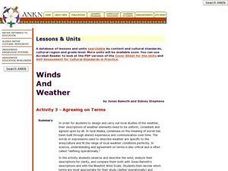Curated OER
Wind Mapping With Bubbles
Students identify wind direction by using bubbles. In this weather lesson, students use a small container of bubbles and a map of their house to create a wind map. Students blow bubbles and note the general direction the bubbles are...
Curated OER
Name that Wind
Students study wind and the direction terms related to wind. For this meteorology lesson, students learn about the wind directions by completing a wind direction activity where kids locate cones marked with the specific wind...
Curated OER
Weather Report Chart
Students complete a weather report chart after studying weather patterns for a period of time. In this weather report lesson, students measure temperature, precipitation, cloud cover, wind speed, and wind direction for a month. Students...
Curated OER
Finding Wind Direction
Students identify the wind direction. In this weather lesson, students use a weather vane to find the wind direction. Students complete a worksheet.
Curated OER
The Air Out There
Students build windmills and weather vanes. In this lesson on air, students build wind vanes and windmills to demonstrate that air moves. Students determine the direction of air movement and measure the speed at which it is moving.
Curated OER
Tracking the Weather
Students study the weather over time in this lesson plan. In this weather lesson plan, students record weather information from the newspaper over a month's time. They record the wind speed and direction, the barometric pressure, the air...
Curated OER
Agreeing on Terms
Students observe and describe the wind, analyze their descriptions for clarity, and compare them both with Jonas Ramoth's descriptions and with the Beaufort Wind Scale. observations.
Curated OER
Wind
Young scholars complete activities to study wind intensity. In this wind study lesson, students discuss wind speed and direction. Young scholars then build a kite and windsock to help them study wind intensity. Students learn to use a...
Curated OER
Fronts
In this fronts worksheet, students use two diagrams to answer 12 fill in the blank questions about fronts, weather patterns, and clouds. Then students complete 2 short answer questions.










